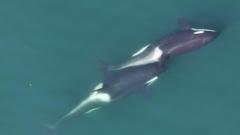How Do Killer Whales Use Kelp for Massage?

Understanding Kelp Massages: The Social Behavior of Orcas in the North Pacific
Recent research has unveiled a fascinating behavior among the Southern Resident orcas in the North Pacific: they have been observed engaging in what can be described as "kelp massages." This unique activity involves the orcas selecting, biting off, and rubbing pieces of kelp between their bodies. Not only does this behavior appear to serve a hygienic function, but it also emphasizes the social bonding among these intelligent marine mammals. The study, published in Current Biology, presents a groundbreaking insight into the lives of killer whales and highlights their capability for tool use.
The Role of Kelp in Orca Behavior
During a 12-day observational study conducted between April and July 2024, researchers utilized drones to capture the intricate interactions of these orcas. The Southern Residents, known for their distinct social structures and behaviors, were seen performing the kelp massage activity on multiple occasions throughout the day. Lead researcher Dr. Michael Weiss from the Center for Whale Research noted that with the drone’s aerial view, they could witness at least one pair of whales engaged in this behavior during each observation session.
What is "Allokelping"?
The researchers have coined the term "allokelping" to describe this behavior, drawing a parallel to "allogrooming," a social behavior seen in primates where individuals groom one another. Allokelping appears to serve a similar purpose: it fosters social bonds and may also promote hygiene among the orcas. Physical contact is crucial for building and maintaining social relationships within their pods, and the killer whales have demonstrated their social complexity through these interactions.
Insights from Drone Technology
The use of drones in this research has revolutionized the way scientists study marine mammals. For almost a decade, aerial surveillance has provided unprecedented insights into the lives of orcas, allowing researchers to observe their social dynamics and behaviors in ways that were previously impossible. High-quality video footage has revealed that the kelp, a relatively small object in the vast ocean, plays a significant role in facilitating these intimate interactions among the large whales.
Health Implications of Kelp Massages
Interestingly, the researchers noted that orcas exhibiting "more peely skin" were more likely to engage in kelp massages. This observation leads to the hypothesis that the behavior may help "scratch an itch" or serve a function in skin health. Just like how primates groom each other to remove parasites and dirt, these massages could potentially aid in maintaining the well-being of these marine mammals.
Social Structures and Cultural Significance
The Southern Resident killer whale population, which inhabits the coastal waters between Vancouver and Seattle, has been the subject of long-term studies for over 50 years. Initiated by Dr. Ken Balcomb, these studies have explored the various threats faced by this endangered population and the unique social structures that exist within their pods. The discovery of kelp massages highlights yet another aspect of their complex society and culture.
The Importance of Social Bonds in Orcas
Orcas are known to be highly social animals, living in matrilineal family groups that display intricate social behaviors. The act of allokelping may serve to strengthen these familial bonds, reinforcing the social fabric that is essential for the survival of their pods. The observation of such behaviors in these intelligent creatures adds to our understanding of their social dynamics, emphasizing the value of social interactions in marine ecosystems.
The Broader Context: Tool Use Among Marine Mammals
The finding that orcas are capable of using tools—specifically kelp for social and potential health benefits—is revolutionary. Historically, tool use has been documented in various species, including primates, birds, and even some marine animals. However, the use of objects like kelp for specific, planned purposes in marine mammals is a relatively new concept. This discovery not only highlights the cognitive abilities of orcas but also raises questions about the cognitive capacities of other whale populations and marine species.
Implications for Conservation Efforts
The Southern Resident killer whale population faces numerous threats, including habitat loss, reduced prey availability, and pollution. As these whales continue to exhibit complex social behaviors, understanding their needs becomes increasingly critical for conservation efforts. The recognition of kelp massages as an essential aspect of their social structure highlights the importance of protecting their natural habitats to ensure they can maintain these behaviors.
Research Legacy and Future Directions
The decade-long research efforts have already yielded significant insights into the lives of these whales. From the role of grandmothers in orca society to the sacrifices females make for their offspring, every finding adds to our understanding of their intricate social systems. The recent discovery of kelp massages exemplifies the depth of intelligence and social complexity in these marine mammals, prompting further research into their behaviors and interactions.
Potential for Future Studies
Future research could focus on identifying whether allokelping is unique to the Southern Residents or if it can be observed in other orca populations and marine mammals. Additionally, investigating the potential health benefits associated with this behavior could shed light on the overall well-being of these animals. Monitoring the impacts of environmental changes on these social behaviors will also be crucial as conservation efforts continue to evolve.
Conclusion: A Call to Action for Orca Conservation
The discovery of kelp massages among Southern Resident orcas not only enriches our understanding of their social behavior but also underscores the urgent need for conservation efforts to protect these remarkable creatures. As they navigate the challenges posed by a changing environment, it is vital to ensure their habitats remain intact so they can continue to thrive and exhibit their unique behaviors.
As we delve deeper into the complexities of orca social structures, we are reminded of the interconnectedness of marine ecosystems and the responsibilities we hold to protect them. The future of the Southern Resident killer whale population lies in our hands—let us commit to safeguarding their existence and celebrating their extraordinary behaviors.
FAQs about Kelp Massages in Orcas
What exactly is a kelp massage among orcas?
A kelp massage refers to the behavior where orcas use pieces of kelp to rub against each other’s bodies. This activity is believed to serve both hygiene and social bonding functions.
How do researchers study orca behavior?
Researchers use drones to observe and film orcas from above, allowing them to capture intricate social interactions and behaviors that are difficult to see from the surface.
Is allokelping unique to Southern Resident orcas?
It is still unclear whether allokelping is exclusive to the Southern Residents or if it occurs in other orca populations and marine mammals. Further research will help answer this question.
Why is social behavior important for orcas?
Social behavior is crucial for orcas as it helps maintain strong family bonds, promotes cooperative hunting, and ensures the overall health and well-being of the pod.
What threats do Southern Resident killer whales face?
Southern Resident killer whales face threats such as habitat loss, reduced availability of prey, pollution, and the impacts of climate change, which can affect their survival and social structures.
As we continue to learn about the fascinating world of orcas, let us remain vigilant in our efforts to protect these incredible creatures and their habitats. How do you think understanding orca behavior can influence conservation strategies? #OrcaConservation #MarineBiology #WildlifeResearch
Published: 2025-06-23 15:05:09 | Category: technology



